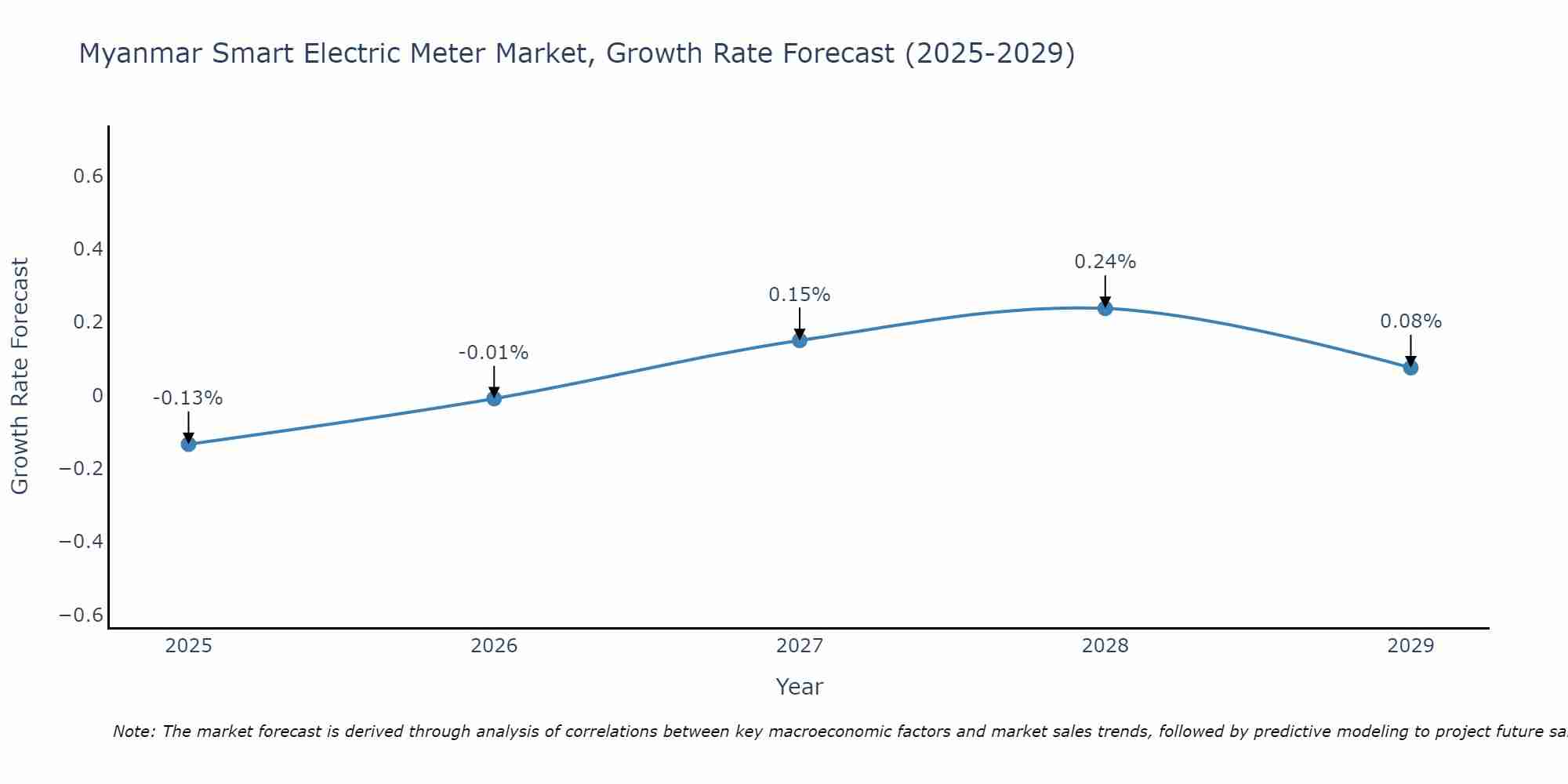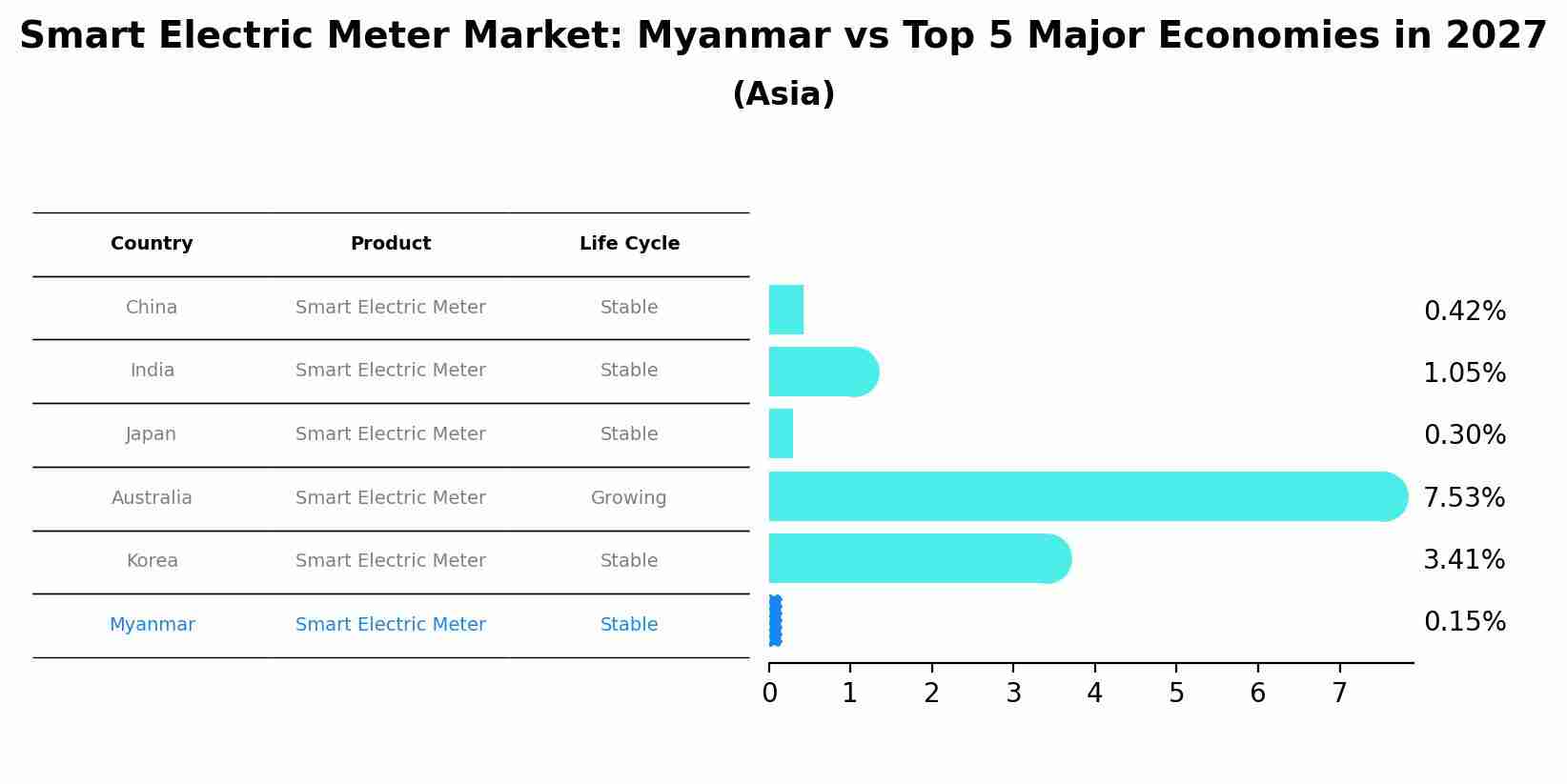Myanmar Smart Electric Meter Market (2025-2031) Outlook | Growth, Companies, Industry, Forecast, Analysis, Trends, Share, Size, Value, Revenue
| Product Code: ETC369334 | Publication Date: Aug 2022 | Updated Date: Jul 2025 | Product Type: Market Research Report | |
| Publisher: 6Wresearch | Author: Sachin Kumar Rai | No. of Pages: 75 | No. of Figures: 35 | No. of Tables: 20 |
Myanmar Smart Electric Meter Market Size Growth Rate
The Myanmar Smart Electric Meter Market is projected to witness mixed growth rate patterns during 2025 to 2029. Starting at -0.13% in 2025, the market peaks at 0.24% in 2028, and settles at 0.08% by 2029.

Smart Electric Meter Market: Myanmar vs Top 5 Major Economies in 2027 (Asia)
Myanmar's Smart Electric Meter market is anticipated to experience a stable growth rate of 0.15% by 2027, reflecting trends observed in the largest economy China, followed by India, Japan, Australia and South Korea.

Myanmar Smart Electric Meter Market Synopsis
The Myanmar Smart Electric Meter Market is experiencing significant growth driven by factors such as increasing energy demand, government initiatives for grid modernization, and a growing focus on energy efficiency. Smart electric meters offer benefits like real-time data monitoring, remote meter reading, and improved billing accuracy. Key players in the market include Landis+Gyr, Itron Inc., and Holley Technology Ltd. The market is witnessing a shift towards smart grid infrastructure and digitalization of the power sector, leading to increased adoption of smart meters. Challenges such as high initial costs and lack of skilled workforce remain, but overall, the market is poised for expansion as Myanmar progresses towards a more advanced and efficient electricity distribution system.
Myanmar Smart Electric Meter Market Trends
The Myanmar Smart Electric Meter Market is witnessing a growing demand for advanced metering infrastructure due to the increasing focus on improving energy efficiency and reducing electricity theft. Key trends in the market include the adoption of smart grid technology to enable real-time monitoring and control of electricity consumption, the integration of renewable energy sources, and the implementation of demand response programs. Furthermore, government initiatives to modernize the country`s energy infrastructure and the rising awareness among consumers about the benefits of smart meters are driving market growth. Key players in the market are focusing on developing innovative solutions to meet the evolving needs of utilities and end-users, thereby shaping the future of the smart electric meter market in Myanmar.
Myanmar Smart Electric Meter Market Challenges
In the Myanmar Smart Electric Meter Market, several challenges are faced, including infrastructure limitations, regulatory hurdles, and financial constraints. The country`s infrastructure, particularly in rural areas, may not be fully equipped to support the implementation of smart meters, hindering their widespread adoption. Additionally, regulatory frameworks and policies related to smart metering may still be evolving, leading to uncertainty for market players. Financial constraints, both at the individual consumer level and for utility companies, can also pose challenges in terms of upfront costs and investment required for transitioning to smart metering technology. Overcoming these challenges will require collaboration between government agencies, utility companies, and technology providers to address infrastructure gaps, establish clear regulations, and develop sustainable financing models for smart meter deployment in Myanmar.
Myanmar Smart Electric Meter Market Investment Opportunities
The Myanmar Smart Electric Meter Market presents promising investment opportunities due to the country`s increasing focus on modernizing its energy infrastructure. With the government aiming to improve electricity access and efficiency, there is a growing demand for smart meters to enable real-time monitoring, accurate billing, and efficient energy management. Investors can capitalize on this trend by entering the market as manufacturers, suppliers, or service providers of smart electric meters. Additionally, partnerships with local utility companies and government initiatives to upgrade the existing metering systems can further enhance the investment potential in this sector. Overall, the Myanmar Smart Electric Meter Market offers a lucrative opportunity for investors looking to participate in the country`s energy sector development.
Jordan Agar Market Government Policies
The Myanmar government has introduced policies aimed at modernizing the country`s electric meter infrastructure through the implementation of smart electric meters. These policies focus on promoting energy efficiency, reducing electricity theft, and improving overall grid management. The government has encouraged partnerships with international companies to provide expertise and technology for the development of the smart meter market. Additionally, regulations have been put in place to ensure data security and privacy for consumers using smart meters. The government`s emphasis on smart electric meters reflects a broader commitment to enhancing the reliability and sustainability of the country`s energy sector while also supporting economic growth and technological advancement.
Myanmar Smart Electric Meter Market Future Outlook
The future outlook for the Myanmar Smart Electric Meter Market is promising, driven by factors such as increasing urbanization, industrialization, and government initiatives to modernize the energy infrastructure. The growing demand for reliable and efficient electricity distribution, coupled with the need for better monitoring and control of energy consumption, is expected to fuel the adoption of smart electric meters in the country. Additionally, advancements in technology, such as the Internet of Things (IoT) and smart grid initiatives, are likely to further boost market growth. However, challenges such as the high initial deployment costs and the need for skilled workforce may hinder the market expansion. Overall, the market is anticipated to witness steady growth in the coming years as Myanmar continues its development trajectory.
Key Highlights of the Report:
- Myanmar Smart Electric Meter Market Outlook
- Market Size of Myanmar Smart Electric Meter Market, 2024
- Forecast of Myanmar Smart Electric Meter Market, 2031
- Historical Data and Forecast of Myanmar Smart Electric Meter Revenues & Volume for the Period 2021 - 2031
- Myanmar Smart Electric Meter Market Trend Evolution
- Myanmar Smart Electric Meter Market Drivers and Challenges
- Myanmar Smart Electric Meter Price Trends
- Myanmar Smart Electric Meter Porter's Five Forces
- Myanmar Smart Electric Meter Industry Life Cycle
- Historical Data and Forecast of Myanmar Smart Electric Meter Market Revenues & Volume By Phase for the Period 2021 - 2031
- Historical Data and Forecast of Myanmar Smart Electric Meter Market Revenues & Volume By Single for the Period 2021 - 2031
- Historical Data and Forecast of Myanmar Smart Electric Meter Market Revenues & Volume By Three for the Period 2021 - 2031
- Historical Data and Forecast of Myanmar Smart Electric Meter Market Revenues & Volume By Communication Technology Type for the Period 2021 - 2031
- Historical Data and Forecast of Myanmar Smart Electric Meter Market Revenues & Volume By Power Line Communication (PLC) for the Period 2021 - 2031
- Historical Data and Forecast of Myanmar Smart Electric Meter Market Revenues & Volume By Radio Frequency (RF) for the Period 2021 - 2031
- Historical Data and Forecast of Myanmar Smart Electric Meter Market Revenues & Volume By Cellular for the Period 2021 - 2031
- Historical Data and Forecast of Myanmar Smart Electric Meter Market Revenues & Volume By End-Users for the Period 2021 - 2031
- Historical Data and Forecast of Myanmar Smart Electric Meter Market Revenues & Volume By Industrial for the Period 2021 - 2031
- Historical Data and Forecast of Myanmar Smart Electric Meter Market Revenues & Volume By Commercial for the Period 2021 - 2031
- Historical Data and Forecast of Myanmar Smart Electric Meter Market Revenues & Volume By Residential for the Period 2021 - 2031
- Myanmar Smart Electric Meter Import Export Trade Statistics
- Market Opportunity Assessment By Phase
- Market Opportunity Assessment By Communication Technology Type
- Market Opportunity Assessment By End-Users
- Myanmar Smart Electric Meter Top Companies Market Share
- Myanmar Smart Electric Meter Competitive Benchmarking By Technical and Operational Parameters
- Myanmar Smart Electric Meter Company Profiles
- Myanmar Smart Electric Meter Key Strategic Recommendations
Frequently Asked Questions About the Market Study (FAQs):
- Single User License$ 1,995
- Department License$ 2,400
- Site License$ 3,120
- Global License$ 3,795
Search
Thought Leadership and Analyst Meet
Our Clients
Related Reports
- Canada Oil and Gas Market (2026-2032) | Share, Segmentation, Value, Industry, Trends, Forecast, Analysis, Size & Revenue, Growth, Competitive Landscape, Outlook, Companies
- Germany Breakfast Food Market (2026-2032) | Industry, Share, Growth, Size, Companies, Value, Analysis, Revenue, Trends, Forecast & Outlook
- Australia Briquette Market (2025-2031) | Growth, Size, Revenue, Forecast, Analysis, Trends, Value, Share, Industry & Companies
- Vietnam System Integrator Market (2025-2031) | Size, Companies, Analysis, Industry, Value, Forecast, Growth, Trends, Revenue & Share
- ASEAN and Thailand Brain Health Supplements Market (2025-2031) | Strategy, Consumer Insights, Analysis, Investment Trends, Opportunities, Growth, Size, Share, Industry, Revenue, Segments, Value, Segmentation, Supply, Forecast, Restraints, Outlook, Competition, Drivers, Trends, Demand, Pricing Analysis, Competitive, Strategic Insights, Companies, Challenges
- ASEAN Bearings Market (2025-2031) | Strategy, Consumer Insights, Analysis, Investment Trends, Opportunities, Growth, Size, Share, Industry, Revenue, Segments, Value, Segmentation, Supply, Forecast, Restraints, Outlook, Competition, Drivers, Trends, Demand, Pricing Analysis, Competitive, Strategic Insights, Companies, Challenges
- Europe Flooring Market (2025-2031) | Outlook, Share, Industry, Trends, Forecast, Companies, Revenue, Size, Analysis, Growth & Value
- Saudi Arabia Manlift Market (2025-2031) | Outlook, Size, Growth, Trends, Companies, Industry, Revenue, Value, Share, Forecast & Analysis
- Uganda Excavator, Crane, and Wheel Loaders Market (2025-2031) | Strategy, Consumer Insights, Analysis, Investment Trends, Opportunities, Growth, Size, Share, Industry, Revenue, Segments, Value, Segmentation, Supply, Forecast, Restraints, Outlook, Competition, Drivers, Trends, Demand, Pricing Analysis, Competitive, Strategic Insights, Companies, Challenges
- Rwanda Excavator, Crane, and Wheel Loaders Market (2025-2031) | Strategy, Consumer Insights, Analysis, Investment Trends, Opportunities, Growth, Size, Share, Industry, Revenue, Segments, Value, Segmentation, Supply, Forecast, Restraints, Outlook, Competition, Drivers, Trends, Demand, Pricing Analysis, Competitive, Strategic Insights, Companies, Challenges
Industry Events and Analyst Meet
Whitepaper
- Middle East & Africa Commercial Security Market Click here to view more.
- Middle East & Africa Fire Safety Systems & Equipment Market Click here to view more.
- GCC Drone Market Click here to view more.
- Middle East Lighting Fixture Market Click here to view more.
- GCC Physical & Perimeter Security Market Click here to view more.
6WResearch In News
- Doha a strategic location for EV manufacturing hub: IPA Qatar
- Demand for luxury TVs surging in the GCC, says Samsung
- Empowering Growth: The Thriving Journey of Bangladesh’s Cable Industry
- Demand for luxury TVs surging in the GCC, says Samsung
- Video call with a traditional healer? Once unthinkable, it’s now common in South Africa
- Intelligent Buildings To Smooth GCC’s Path To Net Zero


















